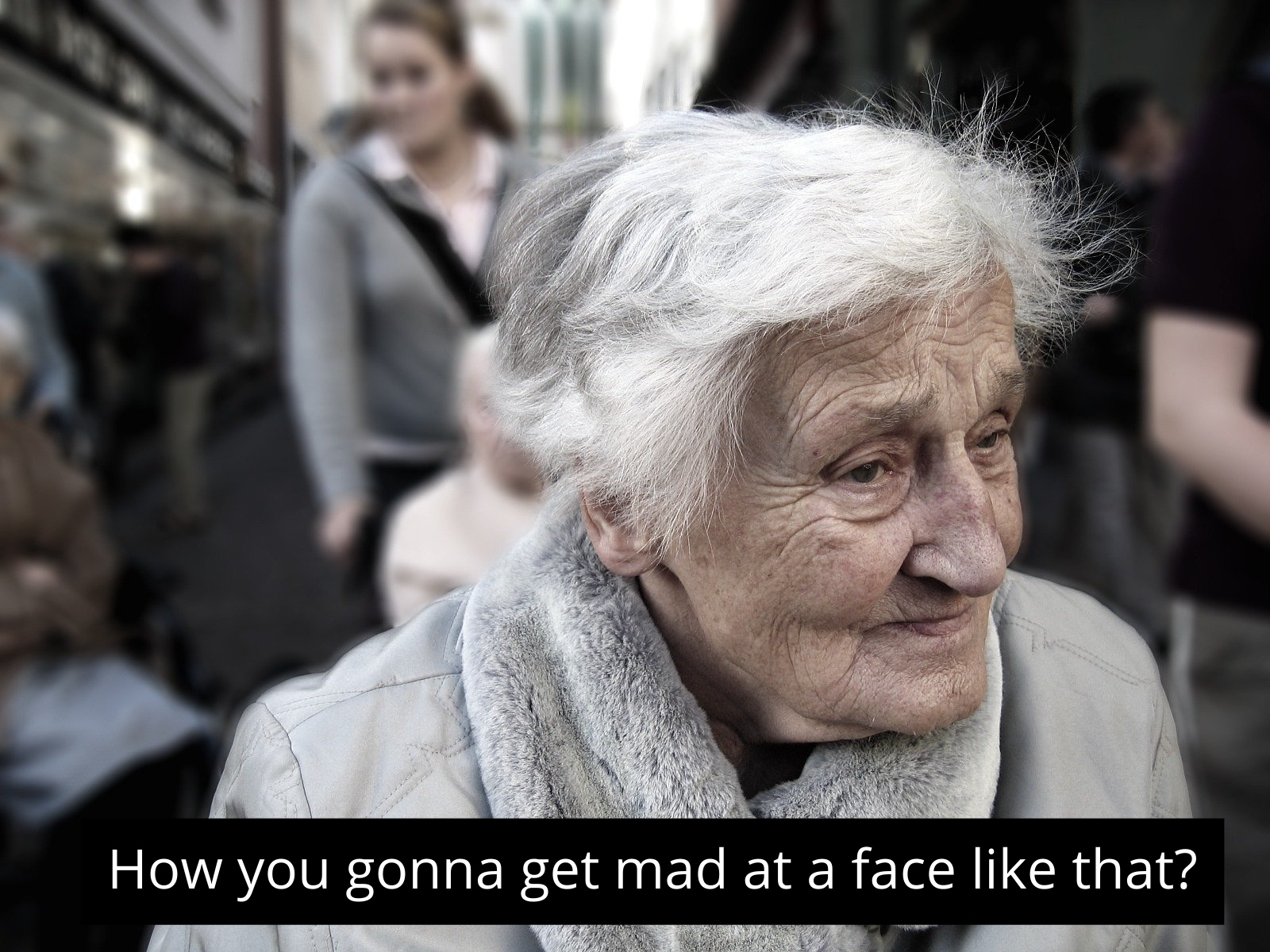What is Empathy?
9 minute read
(12 if you're of the ilk who corresponds via email with Nigerian princes.)

Adam Shepard
Co-founder and COO, Practice Empathy™
It’s a fair question, especially in today’s sociopolitical climate, because, well, hell, if everybody knew what empathy was, there would be a whole lot more listening and understanding and compromising and doling out hugs and handshakes instead of the opposite of all of that.
Empathy. We know it's a good thing but do we fully understand what it is and how to cultivate it? As humans, we are entirely dependent on empathy, and yet why haven’t many of us fully grasped what this word truly means? Is our demise imminent if we can’t embrace an understanding of empathy or are do-gooders simply the yin to the yang of the wicked, and that battle between good and evil is simply a way of life that has and always will exist?
Great questions, you!

Empathy Defined
Empathy is all about the emotions of others. As social beings, the ability to understand each other helps us to get along, form meaningful relationships, and solve each other's problems. Empathy can describe a variety of situations but it all comes down to sensing what another person is feeling. Whether you have a slight inkling, a deep emotional response, or have logically figured out someone else's emotions, you're experiencing a state of empathy. Or maybe heartburn. So if you take an antacid and still feel it, it’s empathy.
Empathy, as the cliche reminds us, is walking in another person's shoes, even if they’re ugly and don’t match the rest of your outfit. It's a chance to step back, have a sip of coffee, and take a moment to ponder a view of the world from another perspective, whatever that viewpoint happens to be and whether you agree or not.
Is Empathy the Same as Sympathy?
Empathy is a very specific experience that is sometimes misidentified. Most commonly, people experiencing sympathy believe that they are being empathetic.
As I have determined to increase my understanding of my own empathy, it has been important to understand the distinction between the two.
Sympathy involves engaging in the emotions of others but not necessarily by understanding or identifying with them. It's closer to the feeling of pity, in which you acknowledge that someone else is suffering. When you're sympathetic, you may also feel some distress for the person in pain and will care about them. However, you aren't really able to fully understand their emotions, whether through logic and imagination, or experiencing those emotions for yourself.

When Lola broke up with Tommy, because she is shallow and superficial and Tommy wouldn’t cut his hair the way Lola wanted it cut, and then Tommy came over to your house after football practice to cry on your shoulder, and you said, “There, there now, Tommy. It’s gonna be okay,” that is sympathy. As you can in no way understand what Tommy is going through specifically (because your hairstyle is flawless), you nevertheless want to console him the best you can.
Last week, when you were looking for an edge in life, and you moved from checkout line 3 to checkout line 4 at your local Kroger, and the sweet little old lady in front of you promptly began to finger through her bulky purse to pull out her eyeglasses and her checkbook to slowly and methodically write out her payment for her groceries, and the clerk just looked at you with eyes that said, “I feel you, playa,” that was empathy. He’s been there; he knows how you felt.

The Evolutionary Origins of Empathy
The success of the human species has come down to one quality: cooperation. Elephants are stronger and cheetahs are faster, but we're the ones who have figured out how working together helps us to achieve more. We've built cities, landed on the moon, and painted great works of art. We’ve evolved from the caves to a civilization, we’ve executed business deals across language barriers and borders, and we’ve tackled some truly perplexing environmental issues.
We invented this thing:

None of this would have been possible without a ginormous dose of empathy.
Other animals also experience empathy, but it's thought that humans feel it more strongly. In particular, mammals show a high level of empathy. Humans, like other mammals, tend to spend a long time raising their babies. (It used to be 18 years; these days it’s more like 30 years.) It's for this reason that empathy most likely evolved. A mother must know what her baby needs, but all she has to go on is the little one's expression and the noises he or she makes and occasional odd smells. From Greater Good Magazine: During the 180 million years of mammalian evolution, females who responded to their offspring’s needs out-reproduced those who were cold and distant.
Think about that: before there were spoken languages or the written word, without understanding something so trivial as a baby's cry, we very likely would never have survived as a species. As a child ages, this ability to empathize remains. This means that they're able to stay part of the tribe into which they were born, and humans can continue to work together to solve problems and achieve great things.
Three Kinds of Empathy
Empathy is often defined as a broad concept, with slightly different variations depending on the situation. For this reason, psychological researchers have come up with three different kinds of empathy: cognitive, emotional, and compassionate. While you may experience all three individually at one time or another, each of these standing alone could have some potential drawbacks.

To the great relief of Mr. Spock, not all forms of empathy are rooted in deep emotions. Cognitive empathy involves reasoning your way into someone else's perspective. Although you may not be able to actually feel what someone else is feeling, you're able to imagine how things look from their perspective. You achieve this using logic and reason, rather than appealing to emotions. So, we can all live long and prosper.
For instance, imagine you're in a tough business negotiation. In order to come to a fair compromise, you have to understand what the other partner is looking for, to understand that both sides just might have to give up a little in order to reach an agreement. This allows you to offer something that they want in return for something you want. In order to do this, top business negotiators will use cognitive empathy, which is not to be mistaken for a mind meld.
Annnnnd...that’s it for Star Trek references.
Cognitive empathy is an important part of forming successful relationships, both personal and professional, allowing you to think more objectively and to take a detached and rational approach to a situation.
If cognitive empathy lacks emotion, then emotional empathy has it in spades. It occurs when you observe a person feeling an emotion and then feel that emotion strongly in yourself. Think about when a person smiles at you and you catch their smile, feeling happy in yourself. Maybe you're watching The Lion King and as Simba starts crying over his dead father, so too do you. You are feeling a similar emotion to the one portrayed on screen or by a real person.
Emotional empathy is considered a useful skill in understanding and responding to other people's emotions. Unlike cognitive empathy, you don't have to work to figure out how someone is feeling; you just know.
However, it's important to understand the downsides to emotional empathy. You can feel overwhelmed by the sight of someone else's emotions. You may even feel far more upset than they do. Or maybe you have an uncontrollable level of emotional empathy where you are overconnected to everyone’s sentiment. This can be unhealthy. Sometimes, it's important to be able to detach yourself from the situation. By keeping cool, calm, and collected, you can often both experience empathy and make better decisions in response to someone's situation.
The third kind of empathy, compassionate empathy, is often considered the most important and socially useful form of empathy because it lies somewhere between cognitive empathy and emotional empathy. Compassionate empathy is when you understand another person's emotions and then act. Not the Oscar winning kind but the kind where you actually do something.

Unlike cognitive empathy, compassionate empathy isn't about merely understanding someone's emotions, and it most assuredly isn't about understanding someone's emotions in order to gain for yourself. Instead, compassionate empathy is about understanding how another person feels so that you can help them. Unlike emotional empathy, you don't need to physically feel someone else's pain. Compassionate empathy should be your goal as an empathetic person.
(Too long, skipped to the end of this section? Know this: empathetic people should aim to increase their levels of compassionate empathy--the actionable empathy--first and then augment it with the cognitive and emotional.)
Why Empathy Matters
Empathy has been essential to the survival and success of the human species. Almost everything that has been achieved in the modern world has relied on empathy, including the invention of the simple floor mop:

Even the terrible suffering that humans have inflicted has required some level of empathy. The Nazis were able to humiliate and dehumanize the Jews because of--not in spite of--their cold, calculated capacity for cognitive empathy.
Fraudsters and fake psychics and girl scouts who charge $5 for a box of cookies you can get from the store for $2 are other examples of people who can use empathy to exploit human emotion. Everyone knows those broads get a patch for ruthless sales tactics while being cute. I have 9 boxes of thin mints in my freezer to prove it. They cognitive empathied the heck out of me.
However, empathy is the only effective means we have for responding to a situation in which a person is suffering and working towards a solution. That's why it's important to not just understand empathy but to also understand it in all its forms. We can then help to encourage healthy versions of empathy rather than misplaced ones.
Empathy matters because it gets us closer to the actual factual and correct answers rather than just what you or I happen to want to believe to be true. Empathy matters because it helps to increase mutual understanding, and it can help to reduce the overall level of suffering in the world. Empathy matters, because fuck each of our individual feelings, and cheers to the feelings of the collective.

Habits of Empathetic People
Empathy is easy to understand, and perhaps just as easy to preach to your friends, but it isn’t always easy to practice. If you want to become more empathetic, then, it's important to make it a daily habit. But what does this mean in principle?
Here are some habits to start trying today that will help you to practice and develop empathy:
- Become an active listener: When someone is explaining their problems to you, don't focus on what your reply will be. Instead, focus closely on what they are communicating to you. This helps you step out of your own head and into someone else's. (But be careful. Some of them have a few extra friends in there.)
- Don't make assumptions: Your own life experience is generally a bad guide to someone else's. Just because you've experienced life in one way, it doesn't mean others will. This is especially true of someone of a different gender or ethnicity. Rather than projecting assumptions onto others, allow them to describe their experience.
- Become more mindful in your daily life: Life often moves quickly and you get so caught up in it that you fail to see the bigger picture. Try to ground yourself in the present moment. You'll become a more reflective person, better able to understand all perspectives.
- Pay more attention to non-verbal cues: People who are truly suffering will struggle to put their feelings into words. You can better empathize with them by observing body language and facial expressions. Pay close attention to a person's eyes and posture. You don't need to be a body language expert for your in-built capacity to empathize to kick in. By just paying more attention, your gut will help you understand how a person is feeling. (Or maybe not. Maybe your wife just keeps saying “everything is fine” despite the fact that you know you did something wrong and you know daggum well that everything is not fine. But eventually, after enough probing, she’s either going to tell you or not. Observing the cues is just the beginning.)
- Get out of your comfort zone: go somewhere you’ve never been. Engage with people unlike you. Watch a movie outside of the normal genres you watch. Go to an ethnic restaurant you’ve never tried. Try harder to get along with your mother-in-law.

My point is this: isn’t it truly remarkable what one can learn when we actually put our assumptions aside and listen and observe? And isn’t it even more remarkable how few people actually put these concepts into operation?
Empathy in the Real World
Why empathy? Why does it matter? Where has it brought us? Specific historical examples abound and inspire us to want to execute empathy in our own cushy lives...
John Howard Griffin Exploring Race in 1950s America
In 1959, when much of the United States segregated blacks from whites, a man named John Howard Griffin sought to understand black lives. He dyed his skin black and then found work as a shoeshiner. By literally putting himself in the shoes of a black man, he realized the horror they faced on a daily basis. This changed Griffin's views on race and he became a prominent civil rights campaigner. Working with Martin Luther King Jr., Griffin helped to advance equality for all races in America. Without having experienced life as a black man, he may never have gained the empathy that helped him win these important victories against racism.
Japanese Pensioners Facing the Radiation of Fukushima
In 2011, a nuclear accident occurred in Fukushima, Japan. In order to get the situation under control, it was essential for some people to go into the zone filled with dangerous levels of radiation. This would very likely cause cancer within 30 years, so it's understandable that many would be fearful. A group of more than 200 pensioners recognized this fear and chose to risk their own health to help out. They knew that they'd likely have passed away before the radiation took effect so they volunteered to do the job. This required an incredible sense of empathy for the fear that younger people must have felt. The pensioners acted calmly and rationally but with great compassion. As a result, they found the right solution to a terrible situation.
Marcus Rashford Tackling Child Poverty
Marcus Rashford is an English professional football player worth as many millions as you could count on your fingers and toes many times over. But he has put his personal wealth and stature to work, and he recently secured a deal with a major British grocery store to help provide food for children living in poverty. Rashford himself grew up in a family without much money, and as with many athletes of the day who have distanced themselves from their humble beginnings, it would have been easy for him to lose empathy for the poor. However, Rashford has worked hard to maintain his connection to children growing up without enough to eat. He remembers what it was like to suffer from hunger, and he has put those feelings into action.
An on and on, billions of times over, billions of small-time stories joining to make a big impact. Empathy, when cultivated correctly, is very possibly the most important quality that humans possess. How we use it is up to us.
* * * *



